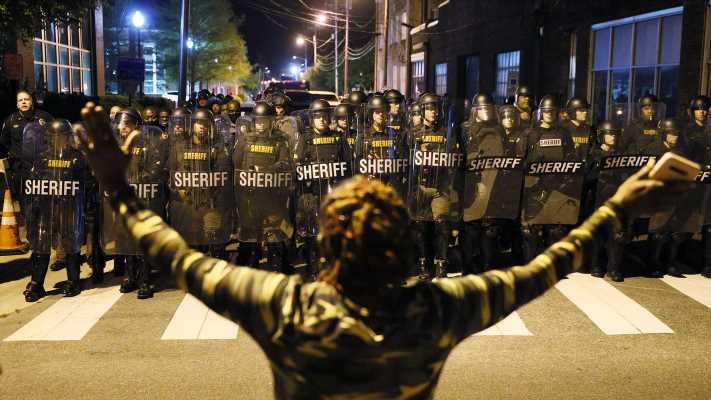WASHINGTON – The Supreme Court overturned a lower court’s ruling Monday in a case about whether St. Louis police used excessive force on a man who died after officers handcuffed him and put their weight on his back during a confrontation inside a jail cell.
In an unsigned opinion that drew dissent from three conservative justices, the court sent the case back to the U.S. Court of Appeals for the 8th Circuit for further review.
Police arrested Nicholas Gilbert, a 27-year-old homeless man, in 2015 on suspicion of trespassing and failing to appear in court for an outstanding traffic ticket. Following a struggle inside the facility where Gilbert was booked, he was handcuffed and shackled as six officers used their weight to subdue him. Gilbert died during the altercation.
The case, filed at the Supreme Court in September, came at a time of heightened tension between police and communities of color following high-profile incidents in which Black people were killed in interactions with officers. Gilbert was white, though his parents noted the similarities between their son’s death and that of George Floyd, the Black man killed by Minneapolis police in 2020.
The majority said it was unclear whether the appeals court thought the use of a prone restraint was always constitutional if a person appeared to be resisting officers. It either failed to consider or thought insignificant evidence such as department guidance instructing officers to move a subject off his stomach as soon as he is handcuffed because of the suffocation risk, the majority said.
“Having either failed to analyze such evidence or characterized it as insignificant, the court’s opinion could be read to treat Gilbert’s ‘ongoing resistance’ as controlling as a matter of law,” the majority opinion said. “Such a per se rule would contravene the careful, context-specific analysis required by this court’s excessive force precedent.”
Associate Justice Samuel Alito, joined by Associate Justices Clarence Thomas and Neil Gorsuch, dissented from the court’s decision and asserted that the was majority dodging the issue in the case.
“This course of action may be convenient for this court, but it is unfair to the Court of Appeals,” Alito wrote. “If we expect the lower courts to respect our decisions, we should not twist their opinions to make our job easier.”
Last month marked the one-year anniversary of Floyd’s killing, an incident that renewed a national debate over policing.
The Supreme Court took an unusually long time to decide whether to hear the case, rescheduling it for consideration more than a dozen times.
Lawyers for the family and civil rights groups wanted the court to set a standard for whether applying weight to a suspect’s back while they are handcuffed and shackled is excessive force. If the justices had done that the practical result would have been that victims and families would find it easier to bring civil lawsuits against police after such incidents.
A medical examiner found the cause of Gilbert’s death was heart disease, exacerbated by methamphetamine and forcible restraint, according to court records. Police involved in the incident have said Gilbert was acting “strangely” and said they intervened because he appeared to be tying clothing around his own neck.
A protester stands with her arms raised as law enforcement officials in riot gear force people off a street as they protest the killing of Andrew Brown Jr. on April 28, 2021 in Elizabeth City, North Carolina. (Photo: Joe Raedle, Getty Images)
Gilbert’s family produced a report from an expert that found Gilbert’s death was caused by asphyxia.
His family pointed to a 1995 bulletin from the Department of Justice encouraging local police to roll suspects off their stomachs once they are handcuffed to avoid the risk of asphyxia. The notice also discouraged police from sitting on a suspect’s back.
The 8th Circuit ruled against Gilbert’s family, creating a split among how the nation’s appellate courts view the practice. Other circuits have concluded that no “reasonable officer” would put pressure on a suspect’s back after the person was subdued with handcuffs and ankle restraints.
The 8th Circuit pointed to Gilbert’s “extensive” heart disease, his resistance and the “large quantity of methamphetamine” in his system.
“Gilbert’s resistance while in the prone position was actually an attempt to breathe and an attempt to tell the Officers that they were hurting him,” the appeals court wrote in its opinion last year. “However, under the circumstances, the officers could have reasonably interpreted such conduct as ongoing resistance.”
Source: Read Full Article

